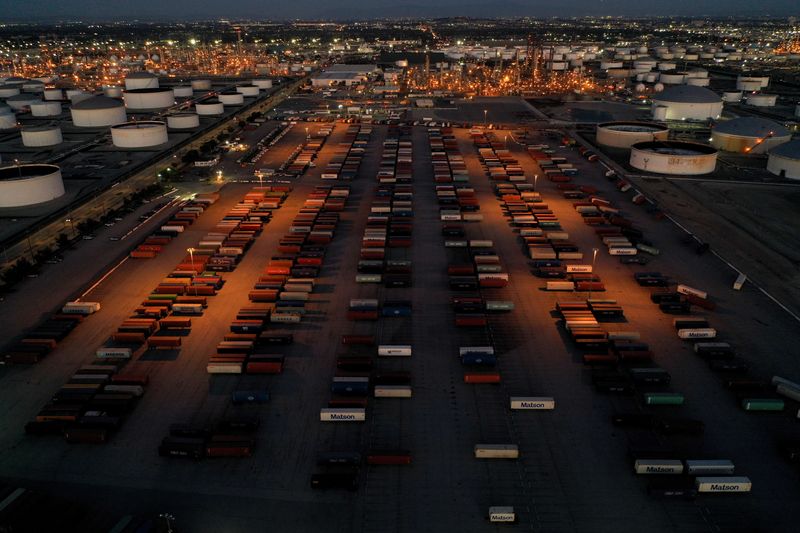By Jarrett Renshaw and Laura Sanicola
(Reuters) - U.S. refiners will try to convince the Biden administration not to ban exports of U.S. fuel to combat record gas prices during a meeting scheduled for Thursday, according to sources familiar with the plans.
The White House has called an emergency meeting with top U.S. refiners to discuss ways to bring down record gas prices that have driven inflation to 40-year highs. The meeting follows weeks of mudslinging between U.S. President Joe Biden and oil companies over who is to blame for the price spikes, which are affecting consumers worldwide. [L1N2Y2111]
In the weeks leading up to the meeting, White House officials signaled to refiners that they were considering either a partial or full ban on fuel exports to help lower the domestic price of gas and diesel. [L1N2Y9018]
The United States is the world's biggest exporter of refined products, lately shipping a near-record of 6 million barrels per day of products including gasoline and diesel, according to federal data. Restricting exports could temporarily flood the U.S. market, lowering prices, but refiners could respond by reducing output.
Refining officials also are preparing to make the case that an export ban would anger allies and lead to refining production cuts as companies lose access to global markets that have become crucial to revenues.
“Not only will limitations or outright bans of petroleum products have the exact opposite effect than intended – raising fuel prices instead of lowering them and placing additional refining capacity at risk – it would hurt our allies in Latin America and Europe," a spokesperson for the American Fuel and Petrochemical Manufacturers said.
Mexico, Canada and Japan are among the top buyers of U.S. refined products, and Europe has increased purchases in recent weeks to make up for lost Russian supply following Moscow's decision to invade Ukraine in February.
The refiners will also suggest their favorite short-term options to lower gas prices, such as waiving summertime fuel specifications designed to reduce smog, relaxing shipping rules requiring union labor and approving new renewable fuel technology, the sources said.
Biden is already calling on Congress on Wednesday to pass a three-month suspension of federal gasoline and diesel taxes.
The White House did not respond to requests for comment.
In 2015, The U.S. lifted a 40-year ban on crude oil exports that was put in place to help keep the country less dependent on the Middle East. In the last two years, the country has become a net exporter of crude oil and refined products, making it one of the most important players in global energy markets.
“If refiners aren’t allowed to export, they’re just going to slow down production and cut the refinery utilization rate,” according to Bob Yawger, director of energy futures at Mizuho.

Yawger said excess products would likely be sent into inventories, which are at multi-year lows.
“Refiners would lose money on it and refiners are not a charity,” he added.